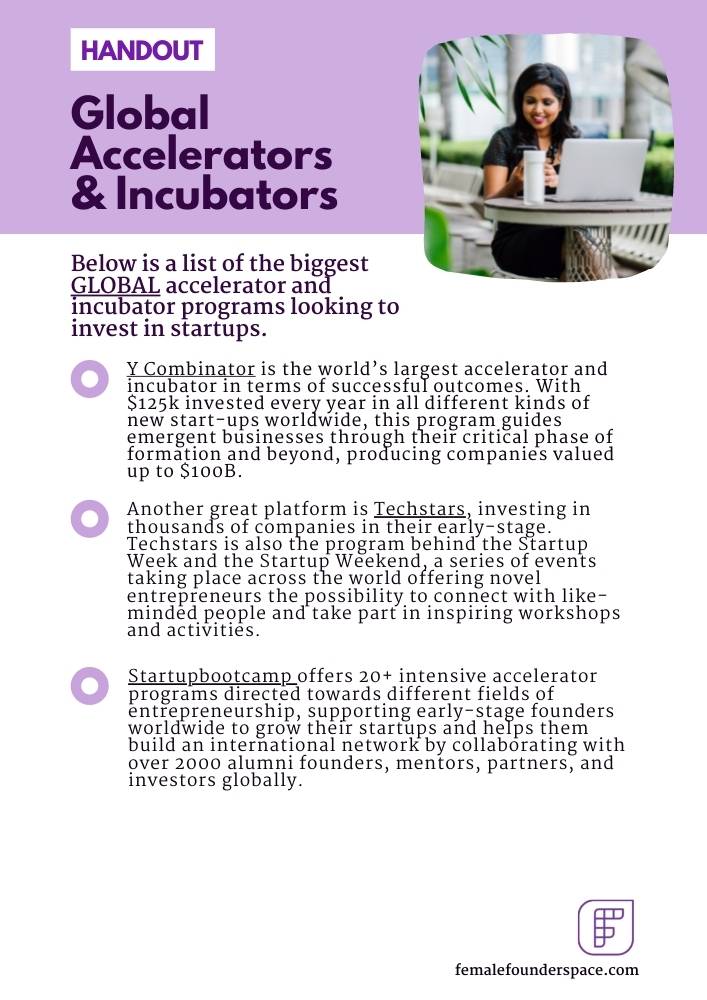Get Funding For Your Startup
-
Take Your First Steps Towards Funding2 Topics
-
Apply for Public Funding6 Topics
-
Bootstrap Your Startup4 Topics
-
Get Familiar with Bank Loans
-
Crowdfund Your Business Idea or Product4 Topics
-
Join A Startup Accelerator or Incubator
-
Raise Venture Capital or Angel Investment4 Topics
-
Start Small, Think Big!
Join A Startup Accelerator or Incubator

Accelerators
Also known as seed accelerators, these programs help advance the growth of your start-up.
What is an accelerator program?
One clear-cut way we can think of an accelerator program is to imagine it “accelerating” your company’s growth. The big idea behind these programs is to give you the tools and resources to do around two years’ worth of development for a business within a couple of months.
The programs are geared towards startups that have already started in their early business phase. Accelerators offer guidance and mentorship in the later stages of the startup development curve, often dealing more with funding. Accelerators advance the growth of these existing companies that already have an idea and business model in place. These programs build upon the startups’ foundations to propel them forward to investors and key influencers.
How do accelerator programs work?
Timeframe: Accelerators operate on a set timeframe, which usually lasts three to four months. During this period, startups build out their business with the support of mentors and capital provided by the accelerator. At the end of the program, startups receive the opportunity to pitch their businesses to investors at usually what’s called a demonstration day (aka demo day).
Application Process: Accelerators use a more traditional and formal model for entry into their program. Participants must apply for a select number of slots in the program. These programs are extremely competitive as the accelerator must select the top startups with promising characteristics such as scalability, investable and promise of rapid growth (for example: Y Combinator, a well-known accelerator, accepts about 2% of the applications it receives and Techstars, another popular accelerator, usually fill its 10 spots from around 1,000 applications).
Costs: Accelerators invest a specific amount of capital in startups in exchange for a predetermined percentage of equity. Due to this investment, the accelerators have more stakes in ensuring the success of the startup.
Funding: Early-stage companies are typically given a small seed investment, as well as access to a large mentorship network, in exchange for a small amount of equity. The mentor network, typically consisting of startup executives, venture capitalists, industry experts, and other outside investors is very important and often the biggest value for prospective companies.
Incubators
What is an incubator?
Incubators support startups or entrepreneurs that possess an idea to bring to the marketplace, but no business model and direction to transition from the innovation phase to actualization. Incubators are typically physical spaces that provide services like training for entrepreneurs, access to networks, and specialist equipment.
How do incubators work?
In most cases, startups accepted into incubator programs relocate to a specific geographic area to work with other companies in the incubator, however, virtual incubators are becoming increasingly popular. Within the incubator, a company will refine its idea, build out its business plan, work on product-market fit, identify intellectual property issues, and network with other startups.
Incubators invest time and resources into advancing local startups, helping them form their business starting from the earliest phase and ending with the companies’ first serious round of finding funding from external investors, known as the series A stage.
Incubators do not traditionally provide capital to startups and are often funded by universities or economic development organizations. They also don’t usually take an equity stake in the companies they support. Incubators are typically dependent on charging rent or membership fees to residents, operate on an open-ended timeline, and are less concerned with how quickly the company grows.
If you want to find out which accelerator or incubator might be suitable for you, check out this handout we prepared for you on “Global Accelerators and Incubators“, where we put down a list of the biggest accelerator and incubator programs operating globally. In this list, we included the biggest ones. However, there are so many other different incubator or accelerator programs in each region focusing on specific industries. Make sure to check your local programs too.

